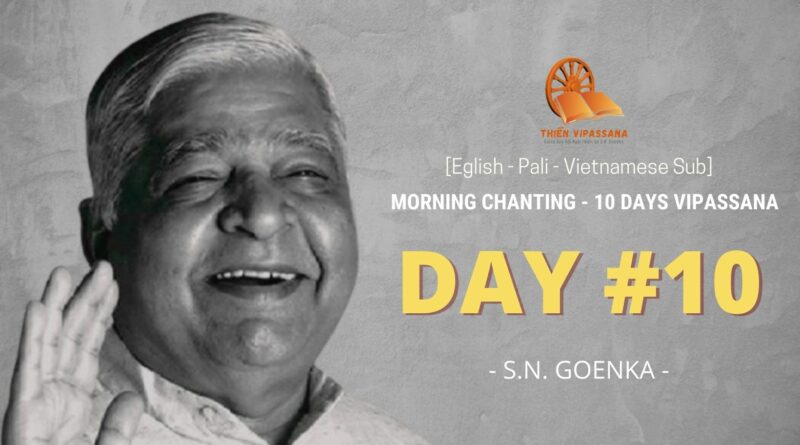BÀI TỤNG BUỔI SÁNG – NGÀY THỨ 10 KHOÁ THIỀN VIPASSANA 10 NGÀY
Buổi sáng ngày thứ 10 trong khoá thiền Vipassana 10 ngày, Ngài S.N. Goenka tụng bài kinh Mettā-Bhāvanā – Thực Hành San Sẻ Tâm Từ
NỘI DUNG BÀI TỤNG BUỔI SÁNG – NGÀY THỨ 10 – TIẾNG PALI, TIẾNG ẤN ĐỘ, TIẾNG ANH, TIẾNG VIỆT NAM
Bài tụng ngày thứ 10 khoá thiền Vipassana 10 ngày – Pali Chanting – S.N. Goenka.pdf
AUDIO CÁC BÀI TỤNG BUỔI SÁNG:
VIDEO BÀI TỤNG BUỔI SÁNG NGÀY 10:
NỘI DUNG BÀI TỤNG (TIẾNG HINDI – PALI – ENGLISH – VIETNAM)
| TIẾNG PALI & HINDI | TIẾNG VIỆT | TIẾNG ANH |
| MORNING CHANTING _ DAY 10 – BÀI TỤNG BUỔI SÁNG _ NGÀY THỨ 10 (Pali)
1.) Jāgo logo jagata ke, bītī kālī rāta; huā ujālā dharama kā maṅgala huā prabhāta. Āo prāṇī viśva ke, suno Dharama kā jñāna; isa meṅ sukha hai, śānti hai, mukti mokṣa nirvāṇa. Āo prāṇī viśva ke, caleṅ dharama ke pantha; dharama pantha hī śānti patha, dharama pantha sukha pantha. Ādi māṅhi kalyāṇa hai, madhya māṅhi kalyāṇa; anta māṅhi kalyāṇa hai, kadama kadama kalyāṇa. Śīla māṅhi kalyāṇa hai, hai samādhi kalyāṇa; prajñā to kalyāṇa hai, pragaṭe pada nirvāṇa. Kitane dina bhaṭakata phire, andhī galiṅyoṇ māṅhi! Aba to pāyā rāja-patha, vāpasa muḍanā nāṅhi. Aba to pāyā vimala patha, pīche haṭanā nāṅhi. 2.a) Deva-āhvānasuttaṃ Samantā cakkavāḷesu, atrāgacchantu devatā; (3x) saddhammaṃ munirājassa, suṇantu sagga-mokkhadaṃ. Dhammassavaṇakālo ayaṃ, bhadantā’ (3x) 3.) namo tassa bhagavato arahato sammā-sambuddhassa. (3x) 4.) Buddhaṃ saraṇaṃ gacchāmi; dhammaṃ saraṇaṃ gacchāmi; saṅghaṃ saraṇaṃ gacchāmi. 5.) Imāya dhammānudhammapaṭipattiyā, buddhaṃ pūjemi; dhammaṃ pūjemi; saṅghaṃ pūjemi. 6.) Ye ca Buddhā atītā ca, ye ca Buddhā anāgatā; paccuppannā ca ye Buddhā, ahaṃ vandāmi sabbadā. Ye ca Dhammā atītā ca, ye ca Dhammā anāgatā; paccuppannā ca ye Dhammā, ahaṃ vandāmi sabbadā. Ye ca Saṅghā atītā ca, ye ca Saṅghā anāgatā; paccuppannā ca ye Saṅghā, ahaṃ vandāmi sabbadā. 7.) natthi me saraṇaṃ aññaṃ, Buddho me saraṇaṃ varaṃ; etena sacca-vajjena, jayassu jaya-maṅgalaṃ. natthi me saraṇaṃ aññaṃ, Dhammo me saraṇaṃ varaṃ; etena sacca-vajjena, bhavatu te jaya-maṅgalaṃ. natthi me saraṇaṃ aññaṃ, Saṅgho me saraṇaṃ varaṃ; etena sacca-vajjena, bhavatu sabba-maṅgalaṃ. Tiratana Vandanā 8.) Iti’pi so bhagavā arahaṃ, sammā-sambuddho, vijjācaraṇa- sampanno, sugato, lokavidū, anuttaro purisa-damma-sārathī, satthā deva-manussānaṃ, Buddho Bhagavā ‘ti. 9.) Svākkhāto Bhagavatā Dhammo, sandiṭṭhiko, akāliko, ehi-passiko, opaneyyiko, paccattaṃ veditabbo viññūhī’ ti. 10.) Suppaṭipanno Bhagavato sāvaka-saṅgho; ujuppaṭipanno Bhagavato sāvaka-saṅgho; ñāyappaṭipanno Bhagavato sāvaka saṅgho; sāmīcippaṭipanno Bhagavato sāvaka-saṅgho; yadidaṃ cattāri purisa-yugāni, aṭṭha-purisa-puggalā, esa Bhagavato sāvaka-saṅgho; āhuneyyo, pāhuneyyo, dakkhiṇeyyo, añjali-karaṇīyo, anuttaraṃ puññakkhettaṃ lokassā’ti. Mettā-Bhāvanā [Ahaṃ avero homi, abyāpajjho homi, anīgho homi, sukhī attānaṃ pariharāmi. Mātā-pitu-ācariya-ñāti- samūhā, Averā hontu, abyāpajjhā hontu. anīghā hontu, sukhī attānaṃ pariharantu Ārakkhadevatā, bhūmaṭṭhadevatā, rukkhaṭṭhadevatā, ākāsaṭṭhadevatā;] Puratthimāya disāya, puratthimāya anudisāya, dakkhiṇāya disāya, dakkhiṇāya anudisāya, pacchimāya disāya, pacchimāya anudisāya, uttarāya disāya, uttarāya anudisāya, uparimāya disāya, heṭṭhimāya disāya; Sabbe sattā, sabbe pāṇā, sabbe bhūtā, sabbe puggalā, sabbe attabhāvapariyāpannā, sabbā itthiyo, sabbe purisā, sabbe ariyā, sabbe anariyā, sabbe manussā, sabbe amanussā, sabbe devā, sabbe vinipātikā— averā hontu, abyāpajjhā hontu, anīghā hontu, sukhī attānaṃ pariharantu. Sabbe sattā sukhī hontu, sabbe hontu ca khemino, sabbe bhadrāṇi passantu, (2x) mā kiñci pāpamāgamā, mā kiñci sokamāgamā, mā kiñci dukkhamāgamā. Bhavatu sabba maagala. (3x) Phira se jāge dharama jagata meṅ, phira se hove jaga kalyāṇa; jāge jāge dharama jagata meṅ, hove hove jana kalyāṇa. (2x) rāga dveṣa aura moha dūra hoṅ, jāge śīla samādhi jñāna. (2x) Jana mana ke dukhaḍe miṭa jāyeṅ, phira se jāga uṭhe musakāna; (2x) Phira se jāge dharama jagata meṅ, phira se hove jaga kalyāṇa. Jāge jāge dharama kī vāṇī, maṅgala mūla mahā kalyāṇī; (2x) jāge jāge dharama kī vāṇī. Jāge buddha sadṛśa koī jñānī, hoṅya sukhī saba jaga ke prāṇī. (2x) Jāge jāge dharama kī vāṇī, maṅgala mūla mahā kalyāṇī; (2x) Jāge jāge dharama kī vāṇī, jāge buddha sadṛśa koī jñānī, hoṅya sukhī saba jaga ke prāṇī. |
MORNING CHANTING _ DAY 10 – BÀI TỤNG BUỔI SÁNG _ NGÀY THỨ 10 (Tiếng Việt)
Mọi người trên thế gian, hãy thức tỉnh! Đêm tối đã qua. Ánh sáng của Dhamma đã đến , bình minh của hạnh phúc. Hãy tới, chúng sinh trong vũ trụ, chúng ta hãy bước trên con đường Dhamma. Con đường Dhamma là con đường an lạc, tự do, giải thoát, niết bàn. Hãy tới, chúng sinh trong vũ trụ, chúng ta hãy bước trên con đường Dhamma. Con đường Dhamma là con đường an lạc, con đường Dhamma là con đường hạnh phúc. Lợi lạc lúc đầu, lợi lạc lúc giữa, lợi lạc lúc cuối – từng bước đều lợi lạc. Có lợi lạc về hành vi đạo đức, có lợi lạc về kiểm soát tâm, có lợi lạc về trí tuệ, dẫn tới Nibbana. Đã bao ngày chúng ta tiếp tục lang thang trong ngõ cụt! Bây giờ chúng ta đã tìm thấy con đường vương giả, chúng ta sẽ không bao giờ quay trở lại. Bây giờ chúng ta đã tìm thấy con đường tinh khiết, chúng ta sẽ không bao giờ quay trở lại. Tới các vị Chư Thiên Chư Thiên từ khắp trong các hệ thế giới, xin hãy tụ họp nơi đây, (3x) để lắng nghe Giáo pháp thuần khiết sẽ dẫn tới cõi trời và giãi thoát, Xin những vị đáng kính, bây giờ là lúc nên lắng nghe Dhamma, (3x) Thành tâm cung kính Ngài, Đấng Thế Tôn, Bậc Chiến Thắng, Giải Thoát, Bậc Tự Giác Ngộ Hoàn Toàn. (3x) Con quay về nương tựa Đức Phật, Con quay về nương tựa Dhamma, Con quay về nương tựa Sangha. Dhamma là con đường con nguyện đi từng bước từ đầu đến đích cuối. Con cung kính Đức Phật; Con cung kính Dhamma; Con cung kính Sangha. Chư Phật trong quá khứ, Chư Phật trong tương lai, Chư Đức Phật hiện tiền, con luôn luôn cung kính. Dhammas trong quá khứ, Dhammas trong tương lai, Dhammas trong hiện tại, con luôn luôn cung kính. Sanghas trong quá khứ, Sanghas trong tương lai, Sanghas trong hiện tại, con luôn luôn cung kính. Con không nương tựa vào nơi nào khác, Đức Phật là nơi nương tựa tuyệt đỉnh của con. Với lời chân thật này nguyện được chiến thắng và hạnh phúc. Con không nương tựa vào nơi nào khác, Dhamma là nơi nương tựa tuyệt đỉnh của con. Với lời chân thật này nguyện quý vị được chiến thắng và hạnh phúc. Con không nương tựa vào nơi nào khác, Sangha là nơi nương tựa tuyệt đỉnh của con. Với lời chân thật này nguyện mọi chúng sinh được hạnh phúc. Ngài là bậc đích thực : đã thanh lọc mọi bất tịnh, diệt trừ mọi phiền não bằng nỗ lực bản thân được giác ngộ hoàn toàn, hoàn hảo trong lý thuyết hoàn hảo trong thực hành, đạt được đích cuối cùng, hiểu biết toàn thể vũ trụ, Thầy dạy cả loài người, thật không ai sánh bằng .Thầy dạy cả chư thiên Đức Phật, Đấng Thế Tôn. Lời dạy của Đấng Thế Tôn, được giảng giải rõ ràng tự mình có thể thấy, kết quả được chứng nghiệm bây giờ và tại đây, mời gọi người đến chứng nghiệm, đưa thẳng tới mục tiêu, ai cũng chứng nghiệm được nếu là người có trí. Những người tu tập tốt hợp thành một đoàn thể đệ tử Đấng Thế Tôn. Những người thực hành cần mẫn hợp thành một đoàn thể đệ tử Đấng Thế Tôn. Tu tập với trí tuệ là người thuộc đoàn thể đệ tử Đấng Thế Tôn. Tu tập thật đúng đắn là người thuộc đoàn thể đệ tử Đấng Thế Tôn. Có thể chia thành bốn hoặc chia thành tám loại những người thuộc đoàn thể đệ tử Đấng Thế Tôn. xứng đáng được cúng dường , xứng đáng được cung phụng, xứng đáng được dâng hiến, xứng đáng được cung kính, ruộng phước của thế gian không ai sánh bằng. Thực hành Metta (nguyện cho tôi hết hận thù, nguyện cho tôi hết thèm muốn, nguyện cho tôi hết giận dữ, Nguyện cho tôi luôn hạnh phúc. Me, cha, thiền sư, họ hàng, và mọi người – nguyện cho họ hết hận thù, nguyện cho họ hết chán ghét, nguyện cho họ hết giận dữ, nguyện cho họ luôn được hạnh phúc Thần linh bảo vệ Thần linh ở địa cầu Thần linh cây cỏ Thần linh trên trời) Về hướng đông, về hướng đông nam về hướng nam về hướng tây nam về hướng tây, về hướng tây bắc, về hương bắc, về hướng đông bắc, về phía trên, Về phía dưới. Mọi chúng sinh, mọi người đang sống, mọi sinh vật, mọi cá nhân, mọi hình thức đang sống, mọi đàn bà, đàn ông, mọi chúng sinh có tâm thanh tịnh mọi chúng sinh chưa có tâm thanh tịnh, mọi người, không phải là người, mọi chúng sinh trên trời, mọi chúng sinh trong địa nguc – Nguyện cho họ hết hận thù, nguyện cho họ hết chán ghét, nguyện cho họ không bị quấy phá, Nguyện cho họ luôn được hạnh phúc. Nguyện cho mọi chúng sinh được hạnh phúc, nguyện cho họ tìm thấy an toàn chân chính (nibbana) nguyện cho họ hượng thụ duyên may, nguyện cho họ không gặp điều dữ, nguyện cho họ không bị đau buồn, nguyện cho họ không bị đau khổ. Nguyện cho mọi chúng sinh được hạnh phúc. Nguyện Dhamma lại tái sinh trên thế gian, nguyện lại có hạnh phúc trên thế gian, nguyện cho Dhamma nảy sinh trên thế gian, nguyện cho mọi chúng sinh được hạnh phúc Nguyện cho thèm muốn, chán ghét, và vô minh bị xóa tan, nguyện cho giới, định và tuệ nảy sinh. Nguyện cho khổ đau trong tâm mọi người chấm dứt, nguyện tươi vui được hồi sinh. Nguyện cho Dhamma lại nảy sinh, nguyện lại có hạnh phúc trên thế gian. Nguyện những lời của Dhamma nảy sinh, cội nguồn của hạnh phúc và lợi lạc. nguyện những lời của Dhamma nảy sinh. Nguyện cho thánh nhân như Đức Phật lại tái sinh, Nguyện lại có hạnh phúc trên thế gian. Nguyện những lời của Dhamma được nảy sinh,nguồn gốc của hạnh phúc và lợi lạc; nguyện những lời của Dhamma nảy sinh. Nguyện cho thánh nhân như Đức Phật lại tái sinh, Nguyện lại có hạnh phúc trên thế gian |
MORNING CHANTING _ DAY 10 – BÀI TỤNG BUỔI SÁNG _ NGÀY THỨ 10 (English)
People of the world, awake! The dark night is over. The light has come of Dhamma, the dawn of happiness. Come, beings of the universe, listen to the wisdom of the Dhamma. In this lie happiness and peace, freedom, liberation, nibbāna. Come, beings of the universe, let us walk the path of Dhamma. The path of Dhamma is the path of peace, the path of Dhamma is the path of happiness. Beneficial in the beginning, beneficial in the middle, beneficial at the end— every step is beneficial. There is benefit in moral conduct, benefit in controlling the mind, benefit in wisdom, leading to nibbāna. How many days did we keep wandering in blind alleys! Now that we have found the royal road, we will never look back again. Now that we have found the pure path, we will never turn back. Address to the Devas From throughout the world systems assemble here, oh devas, (3x) to listen to the pure Dhamma of the king of sages, leading to heaven and liberation. It is now time for listening to the Dhamma , respected ones. (3x) Homage to him, the blessed one, the worthy conqueror, the fully self-enlightened Buddha. (3x) I take refuge in the Buddha, I take refuge in the Dhamma, I take refuge in the Sangha. By walking on the path of Dhamma from the first step to the final goal, I pay respects to the Buddha; I pay respects to the Dhamma; I pay respects to the Sangha. To the Buddhas of the past, to the Buddhas yet to come, to the Buddhas of the present, always I pay respects. To the Dhammas of the past, to the Dhammas yet to come, to the Dhammas of the present, always I pay respects. To the Sanghas of the past, to the Sanghas yet to come, to the Sanghas of the present, always I pay respects. No other refuge have I, the Buddha is my supreme refuge. By this true utterance may there be victory and happiness. No other refuge have I, the Dhamma is my supreme refuge. By this true utterance may you have victory and happiness. No other refuge have I, the Sangha is my supreme refuge. By this true utterance may all beings be happy. Such truly is he: freed from impurities, having destroyed all mental defilements, fully enlightened by his own efforts, perfect in theory and in practice, having reached the final goal, knower of the entire universe, incomparable trainer of men, teacher of gods and humans, the Buddha, the Blessed One. Clearly expounded is the teaching of the Blessed One, to be seen for oneself, giving results here and now, inviting one to come and see, leading straight to the goal, capable of being realized by any intelligent person. Those who have practiced well form the order of disciples of the Blessed One; those who have practiced uprightly form the order of disciples of the Blessed One; those who have practiced wisely form the order of disciples of the Blessed One; those who have practiced properly form the order of disciples of the Blessed One; that is, the four pairs of persons, the eight kinds of individuals – these form the order of disciples of the Blessed One: worthy of gifts, of hospitality, of offerings, of reverent salutation, an incomparable field of merit for the world. Practice of mettā [May I be free from animosity, may I be free from aversion, may I be free from anger, may I preserve myself happy. Mother, father, teacher, relatives, and everyone— may they be free from animosity, may they be free from aversion, may they be undisturbed, may they preserve themselves happy. Protective devas devas of the Earth tree devas devas of the sky] In the direction of the east, in the direction of the south-east, in the direction of the south, in the direction of the south-west, in the direction of the west, in the direction of the north-west, in the direction of the north, in the direction of the north-east, in the direction above, in the direction below. All beings, all living ones, all creatures, all individuals, all having any form of life, all women, all men, all who have attained purity of mind, all who have not yet attained purity of mind, all humans, all non-humans, all those in celestial realms, all those in states of woe— may they be free from animosity, may they be free from aversion, may they be undisturbed, may they preserve themselves happy. May all beings be happy, may they all find real security [nibbāna], may all enjoy good fortune, may they encounter no evil, may they encounter no grief, may they encounter no suffering. May all beings be happy. May Dhamma arise again in the world, may there be happiness again in the world; may Dhamma arise in the world, may there be happiness in the world. May craving, aversion and ignorance be dispelled, may morality, concentration and wisdom arise. May the anguish in the minds of people end, may their smiles be restored again. May Dhamma arise again in the world, may there be happiness again in the world. May the words of Dhamma arise, root of all happiness and well-being; may the words of Dhamma arise. May a wise one like the Buddha arise again, may all beings in the world be happy. (2x) May the words of Dhamma arise, root of all happiness and well-being. May the words of Dhamma arise, may a wise one like the Buddha arise again, may all beings in the world be happy. |





